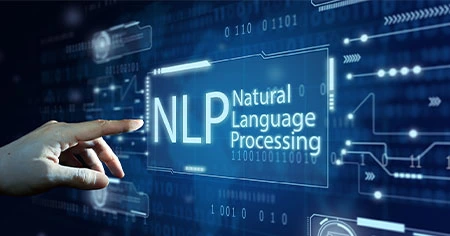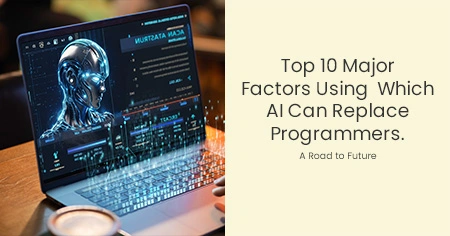The rise of artificial intelligence (AI) is causing significant changes in the programming field. As AI technologies advance, programmers are concerned about being replaced by intelligent machines.
For example, ChatGPT and OpenAI are the most popular neural networks. ChatGPT set a record by reaching 100 million active users in two months. It allows people to program and create chunks of code with ease.
AI algorithms improve project planning, automation, QA, and user experience. A recent study discovered that AI-enhanced software development increased a developer's productivity by tenfold. In this article, we will look at the Top 10 major factors AI can use to replace programmers and the future of AI and programming.
Top 10 major factors using which AI can replace Programmers:
- Evolving Roles of Programmers
AI can automate programming tasks but cannot replicate human programmers' creativity, intuition, and domain expertise. As AI takes over routine tasks, programmers must adapt to new roles, such as supervising AI systems, designing complex algorithms, and solving complicated problems.
- Automation of repetitive tasks
One of the most significant impacts of artificial intelligence is its ability to automate repetitive coding tasks. For example, AI-driven tools can quickly generate boilerplate code, often from the foundations of many applications. This not only saves time but also reduces the possibility of manual errors.
Aside from that, AI solutions offer auto-completion features that suggest optimal code snippets as a developer type.
These features are further augmented by standard code optimizations, which ensure that lines of code follow best practices and are optimized for performance.
By handling these routine tasks, AI enables developers to focus their expertise and creativity on more complex software development. They can spend more time designing intricate architectures, refining user experiences, and brainstorming innovative features that distinguish their applications.
- Program Writing Assistance
AI-powered programming tools can help developers generate code snippets based on predefined requirements. These tools analyze codebases to identify patterns and make suggestions, saving programmers time and effort when writing repetitive code segments.
- Enhanced user experience

Developers gain deeper insights into user behavior, interactions, and preferences using AI's advanced data analysis capabilities. AI can identify which elements resonate with users by tracking and analyzing their real-time interactions with software components. This immediate feedback can be invaluable for developers, enabling them to fine-tune interfaces and functionalities to be more intuitive and user-centric.
From a user-facing perspective, AI-enhanced designs translate to more personalized experiences. Individual users or user groups can have features tailored to them, ensuring software feels bespoke and responsive to their needs.
- Bug fixing
AI can help identify and correct code bugs using large amounts of data, identifying patterns, and making accurate predictions. Programmers can use AI-powered bug detection and resolution tools to accelerate debugging, resulting in more efficient and dependable software development.
- Accurate Project Delivery Estimation
Estimating project delivery timelines is a crucial aspect of software development. AI can use historical data, project complexity, and other factors to provide accurate delivery estimates. This allows project managers and programmers to plan their work better and meet deadlines.
- Evolution of new programming languages
With the rise of AI, future programming languages might prioritize features that make AI integration simpler. We might see languages with built-in functions and libraries for machine learning models, neural network architectures, or AI-specific data processing frameworks. These inclusions could reduce the cost of integrating AI modules and accelerate development.
Furthermore, given AI's strength in pattern recognition, we might expect languages with more concise and intuitive syntaxes that reduce the chance of human errors.
- Natural language processing

Natural Language Processing (NLP) is an AI subfield that aims to help machines understand and interpret human language. NLP can help programmers with code documentation, requirements analysis, and code comprehension tasks. NLP-powered AI systems can boost programmer productivity and efficiency by understanding and translating human language into executable code.
- Strategic decision-making
Artificial intelligence (AI) can automate strategic decision-making and reduce the need for human intervention. AI can improve decision-making by reducing the time spent debating which products and features to invest in. If your AI has been trained on the success and failure of previous software, it can assess the performance of new software and mitigate risk.
Analytics will drive all decisions in the software development process, so expect decision-making to be revolutionized. As computing power and data storage increase yearly, computers can supplement human intelligence by helping us make better decisions.
- Code optimization
AI algorithms can analyze code bases and identify areas for improvement. AI can help programmers create more efficient and robust software solutions by suggesting code improvements and performance enhancements. This improves the code quality, the software's performance, and user experience.
Future of AI and Programmers:

AI has yet to reach the level of replacing programmers and human intelligence. The "augmented" developer movement aims to improve code speed and accuracy. It can also help many people get into the tech industry.
- While AI is undoubtedly transforming the programming landscape, it is more likely to complement human intelligence rather than completely replace it.
- AI is good at automating repetitive tasks and making suggestions but requires human creativity and critical thinking skills. Human programmers and AI technologies will need to work together to innovate and solve problems in the future.
- The future of programming lies in collaboration between human programmers and AI systems. AI technologies can help programmers can help programmers boost productivity, improve code quality and shorten development cycles.
- AI can handle routine tasks, freeing programmers' time for more complex design, architecture, and innovation. The coexistence of human intelligence and AI in programming will lead to more efficient, intelligent, and innovative software solutions.








